This letter was written in three parts, separated by several days. It’s about scouting a dubious location…and then filming there. It is also about the man who is the voice of Paul Weidlinger in the film.
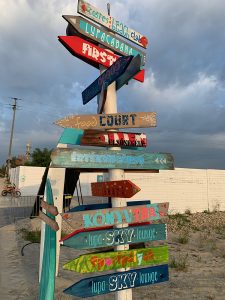
Lupa beach is the tackiest place in Hungary. According to the PR, “Here you can get a true seaside feeling; you can sip on cocktails, swim, play beach volleyball…” in the midst of land-locked Hungary. Tons of white sand have been trucked in to create a beach on the shore of a modest sized lake, a beach, it is claimed, can accommodate 10,000 people. The pitch continues;
…the coastline has been divided up to satisfy everyone’s demand and budget. Lupa Strand provides the traditional beach experience, while Lupa Premium Beach offers significantly better services with quality restaurants. Those who want more exclusive services can purchase VIP tickets or rent a private sector of the coastline with private staff.
The place is like a bad dream, a surreal and slightly sinister cartoon of a Caribbean resort.
What does this have to do with The Restless Hungarian? It all comes down to that white sand. In the script Paul fashions golem-like sand figures, and teaches little Tom how to make drip sand castles. Why not go to a real beach, say on the coast of Croatia, you might ask? The two Hungarian actors who play Paul and Tom also appear in scenes on a film stage in Budapest. To transport them and the crew to an actual ocean beach would break the budget, which led tp my picking my way through a forest of lurid lounge chairs on a strip of sand bordering mirror-still lake water.
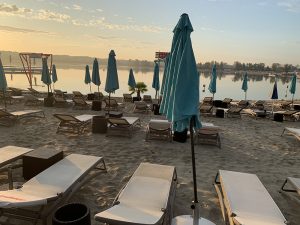
When Máté, Zsófi, Dori, Andor, and I get to the spot we have chosen for the master camera angle, we have an unwelcome surprise. Moored rafts, buoys, and strange floating shapes resembling swans mar the view of open water. Because the beach is officially closed for the season, management had assured us that these would be removed, but they were still there. Any chance of moving these eyesores before we shoot on Monday morning? No way. An end of season VIP bash is scheduled for Sunday, and they’ve paid good money for those swans… certainly more than we’ve paid for the privilege of filming on the only white sand beach in Hungary. We are screwed. Bad weather is on the way. Temperatures will be dropping and actors in bathing suits will be disinclined to act.
Three Days Later
Plan B. Get high in the air and shoot down onto the beach, for a bird’s eye view. Show only a thin margin of water unsullied by floats, buoys, and plastic swans. Don’t pretend we are on the edge of an ocean. We are somewhere on a beach in a dream. Will it work? Discussions ensue between Máté, and the Key Grip. How do we get a camera high enough for the hero shot? A high ladder risks tipping over in the soft sand, a cherry picker is outside the realm of financial feasibility. Fecó, the key grip, suggests a platform, like a painter’s scaffold with duck feet. It could work.
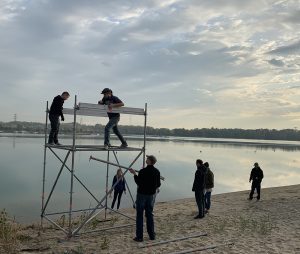
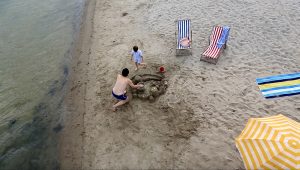
On the day of the shoot we arrive at Lupa beach just as the sky is beginning to lighten. It is not raining, but it’s cold. I pick a place for Fecó and his sidekick, László, to erect the platform, reassuringly stable and three meters high. Máté goes in search of an electric heater to keep the actors warm. I block and rehearse the scene with Tibor Legát, who plays my father at the age of 45, and Lőrinc Pap who is me at the age of five. They are building sand castles and, later, huge golem-like figures. My sister, age 18, played by Melina Papas, is tanning on the periphery, resenting all the attention that her little brother is getting.
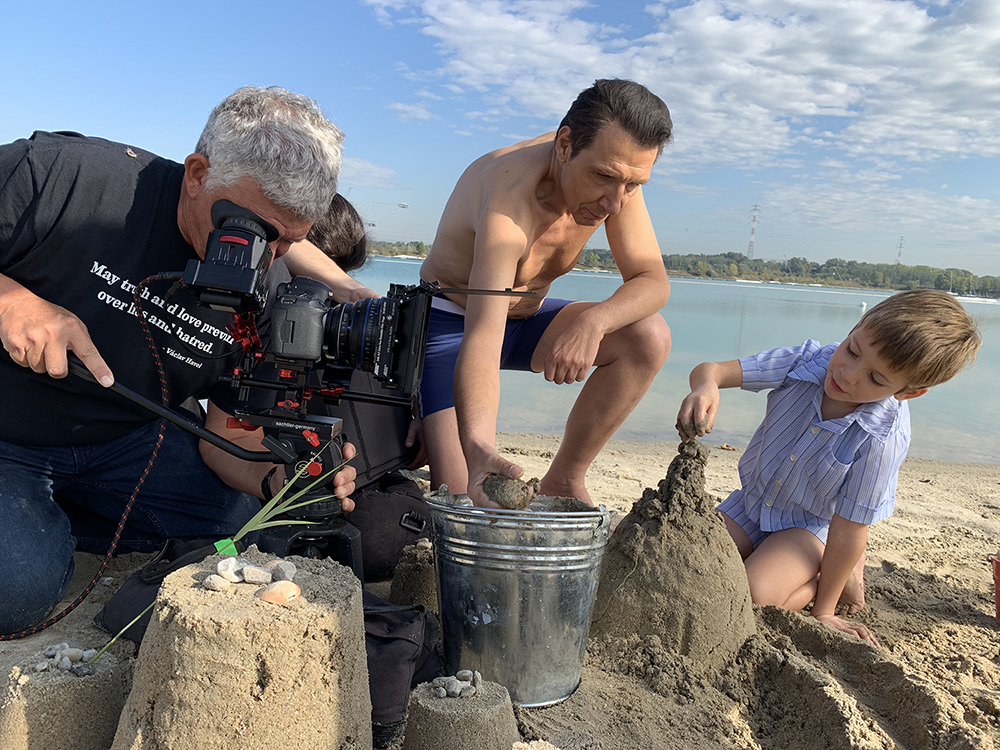
I think about the work that my wife, Sharon, a psychologist, does in some group settings. She calls it “family sculpting.” A person selects and directs others in the group to portray members of their family and act a crucial moment in their childhood. This is what I have been doing, over and over again, in the past five years, writing a book and then the film script. Now it is becoming manifest in a most startlingly tangible way with costumes, make-up, and props and actors.
The sun rises and the heater is no longer necessary. We are incredibly lucky with the weather, completing the beach shots by lunchtime. After lunch is it time to film Tom, age 11, sailing his model sailboat, but suddenly it gets incredibly windy. The little prop boat capsizes within seconds. Csenge suggests going to the protected, windward side of the lake. She puts on a wet suit and swims out into deep water, towing the little boat behind with fishing line. The idea that the line will be invisible to the camera doesn’t work and the boat keeps capsizing. It was designed to adorn a mantlepiece, not float. In one final desperate attempt, Csenge proposes to lash a long stick to the boat’s rudder and swim, hidden, underwater, while guiding the boat’s progress on the surface with the stick. I gently tell her it’s time to move on. In the end, little Tom walks along the shore hugging his boat, looking but never finding a place to launch it, as waves crash on the beach and giant trees toss in the wind like grass. The pleasure of telling you this story compensates for not actually being able to film the scene as planned. Shit happens.
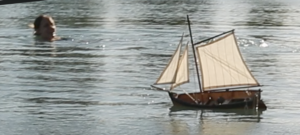
Two Days Later
There are two people playing my father in the film, Tibor Legát in front of the camera and András Kepes in front of the microphone. On Friday I had the pleasure of working with András at a recording studio. I needed a person fluent in English, but with a light Hungarian accent. Finding such a person is not difficult, but getting them to sound convincing in English is a real challenge. The syntax, the order of nouns, verbs, subjects and objects in a Hungarian sentence, is entirely different than in English. Try putting a Hungarian phrase into Google Translate. What comes out is a string of entirely nonsensical English words. Therefore, it is very hard for a Hungarian to “act” or speak English in a way that is emotionally resonant. When I first asked András if he would do this, he was understandably reluctant. He is a very well-known television producer, director, and on-camera host of arts and culture programs, as well as a university professor of media in society. Why would someone who is famous for being so beautifully articulate in their native tongue risk a performance in English?
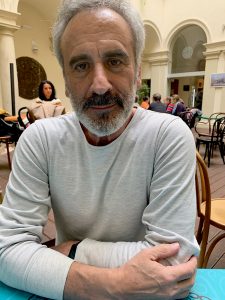
I begged Andras. I had interviewed him in English when I came to Budapest in 2014, and the way he spoke reminded me so much of my father, only clearer and better. “I need you to be my dad,” I said to him and he finally relented. We did a practice recording session over the telephone a couple of months ago and he put up with my corrections of his pronunciation and emphasis.
I’ve worked with famous people before, and I’m always nervous in anticipation, because I wonder how seriously they will take me and my project in juxtaposition to their much grander accomplishments. Andras took me, my father, and The Restless Hungarian seriously. The proof was in the work which he had carefully prepared. In addition to great line readings, he sang an English lullaby that my father sang to me as a child… gently, movingly, and in perfect pitch. Thanks, Andras. Thanks Dad.